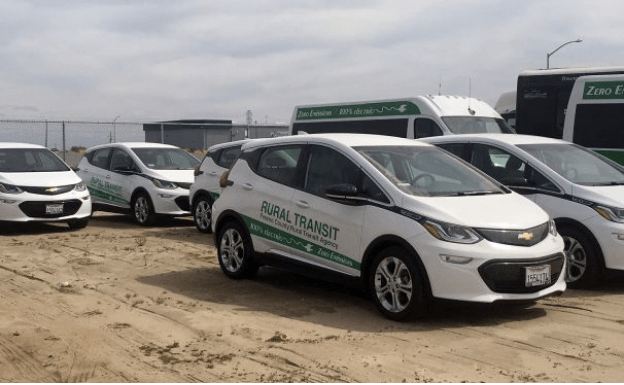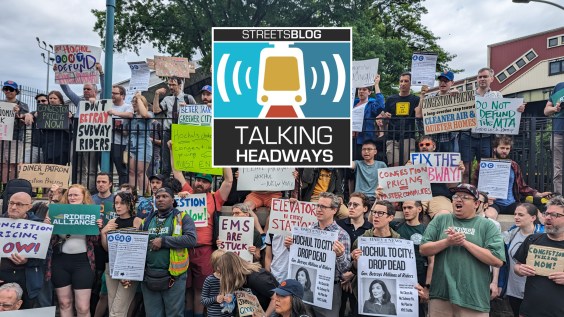Note: GJEL Accident Attorneys regularly sponsors coverage on Streetsblog San Francisco and Streetsblog California. Unless noted in the story, GJEL Accident Attorneys is not consulted for the content or editorial direction of the sponsored content.
The Fresno County Rural Transit Agency (FCRTA) just launched a program called REV-UP (Rural Electric Vehicle Utilization Project) to provide inexpensive, zero emission point-to-point rides for residents of rural Fresno county. For now, the pilot is offering rides in the area west of Fresno, serving areas around West Park, Biola, and Kerman.
The program is funded by Fresno's local transportation sales tax Measure C, and benefits from numerous related planning efforts undertaken with state grants from the Air Resources Board and the Transformative Climate Communities grant Fresno received two years ago.
Residents of these areas can reserve a ride in an electric vehicle in advance, or call up a ride when they need it, and they pay only $5 per ride.
Providing transit in a rural area is a huge challenge, especially in California's widely spaced Central Valley towns, where many residents are low-income and lack access to private vehicles. Rural Fresno County has transit service, but it is sparse, and it is too expensive for the agency to run regular routes out to everyone who needs them. To use existing transit, "people walk in the heat for three or four miles on the side of the road, with no sidewalk, and then wait all day for the ride back - that's what transit can offer right now," said Chrissy Mancini Nichols, who headed up a team working on REV-UP. "There is no Uber or Lyft in rural areas. Rural transit is so challenged, even before COVID; there just aren't enough resources to provide the needed service."
Mancini Nichols works for Walker Consultants, which was hired by FCRTA last year - before the pandemic - to help the small agency figure out how to improve its existing and underused on-demand service, which is expensive both for the agency and for the riders. "As part of our study, we met with a ton of social services agencies, both nonprofits and government agencies, to find out how their clients get around - to job training, or medical appointments, and the like." Many clients had few options.
The planners also wanted to figure out ways to coordinate with the services agencies to create a system that could serve as many people possible. They looked at likely routes - where people live, where they are likely to want to go - as well as at potential ways to encourage sharing rides to make them as efficient, and cost-effective, as possible.
That was all before the pandemic hit. They have had to add precautions to their plans, including limiting passengers to people from the same household, barrier shields for drivers, keeping the windows open, and sanitization.
The REV-UP fleet comprises between two and ten Chevy Bolts, all-electric passenger vehicles that get about 200 miles per charge.
"It is important that we use an electric fleet, because Fresno County has some of the worst air in the nation," said Mancini Nichols. "Our goal is to provide low-cost, zero emission transportation to the people who need it most."
But e-vehicles also bring the challenge of where and how to recharge them. Fresno County has been installing electric vehicle charging stations for the past several years, but there is still only one fast-charging station available in the county.
Mancini Nichols said the eventual goal is to have charging depots in Fresno's cities, where people could connect to agency bus services, and the vehicles can recharge after delivering people to the hubs.
Like all transit agencies, the FCRTA has to meet strict funding requirements that include a minimum farebox return (transit agencies must collect a minimum portion of their operating costs from fares in order to receive state and federal funding). It might be time to change that.
"Cities are finally able to be super nimble in testing things out, like parklets and bike lanes," said Mancini Nichols. "Letting transit agencies do that too is more important than ever. Revisiting some of these policy restrictions is important; if they relaxed [farebox recovery rules] a lot more agencies would be testing things out."
Add rural transit's long distances, the need to pay drivers a fair wage, and even marketing these services to people who don't know about them, and a program like this can be expensive and time-consuming. But FCRTA has a very small staff. "This is a lifeline service for a lot of people. We need to invest in rural transit," continued Mancini Nichols.
Although electric vehicles cannot solve every problem associated with climate change and pollution, the state's focus on clean vehicles - and its laws requiring agencies to consider the communities most impacted by climate change - are providing important benefits to people who need help. Programs like REV-UP and the volunteer-based Raiteros program in Huron make it easier for people living in California's rural areas to get where they need to go in the cleanest vehicles possible.






